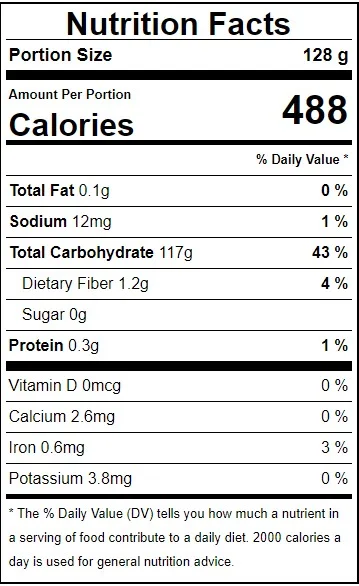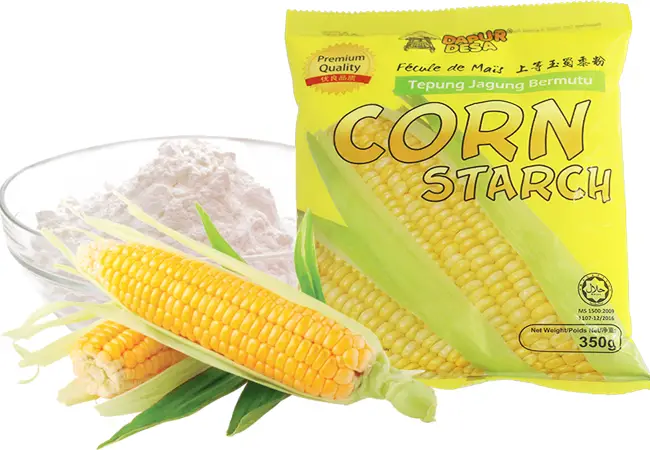Corn, AKA maize (in some parts of the world), is healthy food for adult people. It grows in yellow color and can be a source of many types of recipes and food items. But, people often ask, “is cornstarch safe for babies to eat?”.
Well, simply answered, cornstarch is indeed safe for babies to eat. But, there must be moderation in treating your baby with cornstarch. Not only that, before feeding your baby cornstarch, you must know all about this food item, so you don’t cause digestive problems to your baby.
Luckily for you, in this very discussion, we have arranged everything you need to know about cornstarch. In order to safely feed your baby many types of food items with cornstarch, you can just read through our article here and get quickly informed.
So, without any more wait, let’s just get to know all the necessary info regarding if it’s safe to feed your baby cornstarch. Let’s go right now!!
What Is Cornstarch?
Corn is a purely carbohydrate-based food item that can be easily digested by anyone. And, it is not known to have any toxic constituents in it. Furthermore, it also comes in a powder form, which is known as cornstarch. But, you cannot just eat plain cornstarch. In order to eat cornstarch, you have to mix it with other food ingredients and then consume it.
Moreover, for most parts, people apply cornstarch in liquid food items to increase the thickness and the texture of the food. Other than carbohydrates, you mostly won’t find any other nutrition items in cornstarch. So, if you only eat cornstarch for an extended period, it is pretty sure that you won’t get any other nutrient items in your body other than carbohydrates.
Babies Eating Cornstarch: Is It Safe?
Yes, definitely. It is perfectly safe for a baby to eat cornstarch in his/her meal items. But, be careful. You shouldn’t make it the only solid food that the baby eats. Because corn starch is solely based on carbohydrates, it doesn’t have any other essential vitamins that a baby would need. So, if you’re constantly feeding your baby cornstarch-based food items, you run the risk of putting your baby in malnutrition.
In addition to that, you also need to be careful not to make the cornstarch the first food your baby eats. In the first days of your baby eating solid foods, you need to give him/her easily digestible food items such as mashed vegetables and fruits. Simply put, you need to ensure that your baby is getting foods that have essential vitamins, minerals, protein, and necessary food oils.
Furthermore, if your family members have a history of being allergic to cornstarch, it might be a better idea to not let your baby eat it (unless you’re absolutely sure that your baby doesn’t have an allergy to cornstarch). Also, if your baby has asthma problems, it’s vital that you keep your baby away from cornstarch (lest the baby accidentally inhales the powdery cornstarch).
Possible Risks Of Giving Cornstarch To Your Baby
Although cornstarch is a 100% safe food for a baby to consume, it comes with several risks as well. Just like any other food item, cornstarch should also be fed to the babies in strict moderation. Also, you need to be careful of the possible risks of feeding cornstarch that we have mentioned below:
1. Inhaling Cornstarch:
Cornstarch is a powder food item. So, it is very easy to inhale cornstarch when you are breathing. What’s more, this issue can have an even bigger impact if your baby inhales it.
So, whenever you’re preparing food items with cornstarch mixed in it, make sure to prepare it at a safe distance away from your baby. It’s because, if your baby inhales the cornstarch dispersed in the air, it will cause severe respiratory problems to your baby.
2. Intolerance To Cornstarch:
Although it’s very unlikely, intolerance to cornstarch can occur. For your information, intolerance is the tendency of a person’s digestive tract to constantly reject a definite type of food item. So, we recommend that you make sure if your baby is intolerant to cornstarch or not.
And, after feeding cornstarch-based food items to your baby for the first time, if you notice any uncommon traits such as diarrhea, gas, bloating in your baby, you should understand that your baby has intolerance towards cornstarch. In that case, it’s the best advice to avoid feeding your baby cornstarch-based food items.
The good news is, sometimes you can prevent intolerance towards cornstarch by mixing cornstarch with other food items such as vegetables, milk, and dairy food items. Once you are sure that your baby is intolerant to cornstarch, you can experimentally feed your baby food items that have a very small amount of cornstarch mixed in. Why do we suggest that? It’s because it is very likely that your baby won’t be as intolerant to those mixed food items (compared to raw cornstarch food items).
3. Allergy To Cornstarch:
If your family has a history of having a high amount of Lipid Transfer Protein(LPD) in the body, the likelihood of your baby having an allergy to cornstarch is pretty high. In that case, it is very risky to feed your baby cornstarch-based food items. In the worst-case scenario, if you feed your baby cornstarch, he/she can face severe eczema or allergic rhinitis. So, we recommend that you keep cornstarch away from your baby if your family is allergic to it.
4. Possibility Of Malnutrition:
Cornstarch is a processed food that is derived from corn. Also, it is converted to powder form by starch machines. Now, if you constantly feed your baby with cornstarch-based food items, your baby might get fully accustomed to digesting only processed and bland food items. As a result, you run the risk of putting your baby in severe malnutrition.
This is why I recommend that you impose moderation in feeding your baby cornstarch-based food items. But, you can surely mix cornstarch in other vegetable-based food items to ensure enough vitamin and carbohydrate content in the baby’s food intake.
Possible Benefits Of Feeding Cornstarch To Your Baby:
Although there are a few risk factors regarding feeding your child cornstarch-based food. However, mostly it has highly nutrition benefits. Let’s review them one by one:
1. Boost In Weight Gain:
If your baby is suffering from poor body weight, a carbohydrate-based food item such as cornstarch might just be the solution to it. Because cornstarch is purely based on carbohydrates, it can boost up the baby’s weight gain.

It’s also worth mentioning that 100g of cornstarch can provide about 350 calories to the body. That’s why cornstarch can also be a healthy source of calories for your baby. What’s more, if you mix cornstarch with other vegetable or dairy items, you can even make an ultimate food item that provides your baby with just the amount of vitamins and carbohydrates that your baby needs. As a result, your baby can have a healthy weight gain as well as a boost in nutrition.
2. Ensuring Ample Growth And Development:
It’s worth mentioning that cornstarch is rich in the vitamin B complex. That, in turn, can ensure that your baby has healthy body growth and development. Also, items such as Thiamin and Niacin (found in cornstarch) support the growth of nerve and brain cells. On top of that, these nutrition items also support improved metabolism and cell development. So, it’s fair to say adding a moderate amount of cornstarch to your baby’s diet can indeed be beneficial.
3. Improved Muscle Generation:
Corn is naturally enriched with potassium, magnesium, and iron as well. Luckily, these items support ample bone growth in children. Furthermore, these minerals can also boost up the nerve function of children.
4. Improve Fiber Digestion:
Another good thing about corn is that it’s rich in good fiber. So, if you feed cornstarch to your baby in moderate amounts, your baby will develop ample ability to digest healthy fibers. Furthermore, eating cornstarch will ensure that your baby doesn’t get hungry very often. In turn, you can stay relaxed and worry-free as a parent as well.
Frequently Asked Questions:
1. How do I know if my baby has an allergy to corn?
If your baby has an allergy to cornstarch or corn, you will immediately notice symptoms such as skin rash, runny nose, vomiting, nausea, diarrhea, headache, asthma, etc in your baby. And, these symptoms will arise just after feeding your baby cornstarch.
So, if you do notice that your baby is showing these symptoms after eating food items with corn in them, you must stop feeding your baby that particular food item.
2. Which cornstarch or corn is better for the baby?
Health experts worldwide recommend purchasing non-GMO corn. And, this also goes for food items that have cornstarch in them. Furthermore, whenever you buy cornstarch or corn, it is recommended that you consume it within 3 days of purchasing it.
3. What are some delicious corn items that I can make for my baby?
If you want to make food items with cornstarch, you have a lot of options. First off, you can make Corn Purée. It’s a super healthy food item for babies under 1 year of age. Also, it can simply be made by mixing breast milk and water with cornstarch.
Secondly, if your baby is older than 6 months, you can make Pumpkin And Corn Porridge. This food can be easily prepared by mixing cornstarch with water, milk, and pumpkin. Furthermore, you can also make Corn Purée by mixing carrot, potato with cornstarch as well.
Final Verdict:
The bottom line is, cornstarch can be a very useful food item for the baby to have. But, it must be fed in moderate amounts. Also, you can use cornstarch to increase the texture of other liquid food items as well.
However, if you see any adverse effects on your baby’s health after feeding your baby cornstarch, you should immediately seek the doctor’s care. Moreover, we even recommend that you contact your doctor before feeding your baby cornstarch. At last, we wish the best for you and your baby’s health. See you again!!

